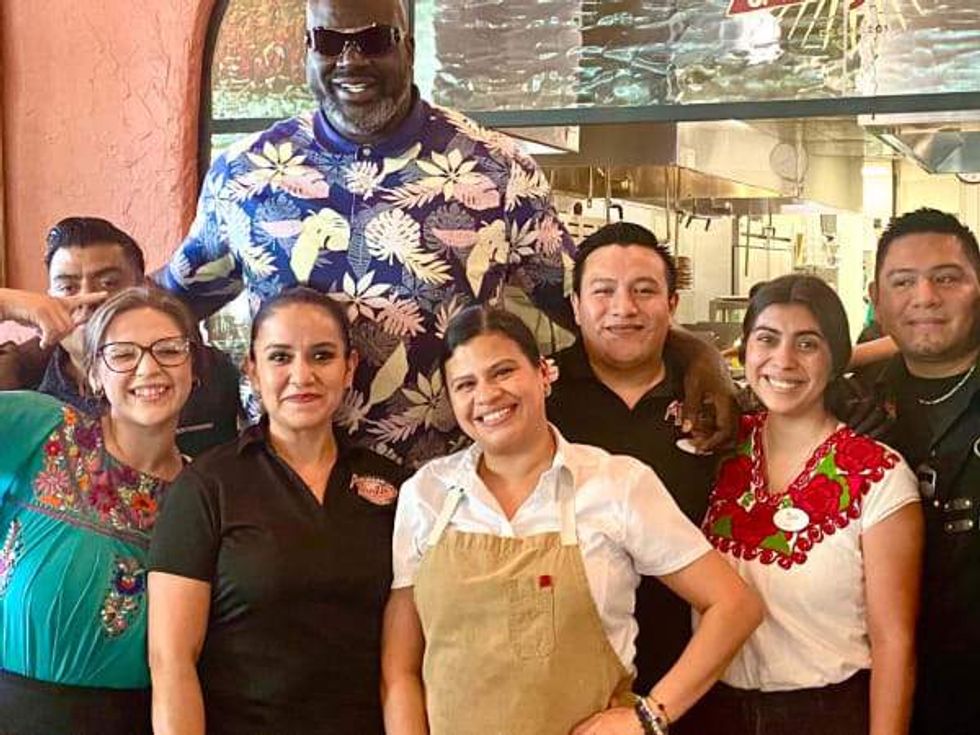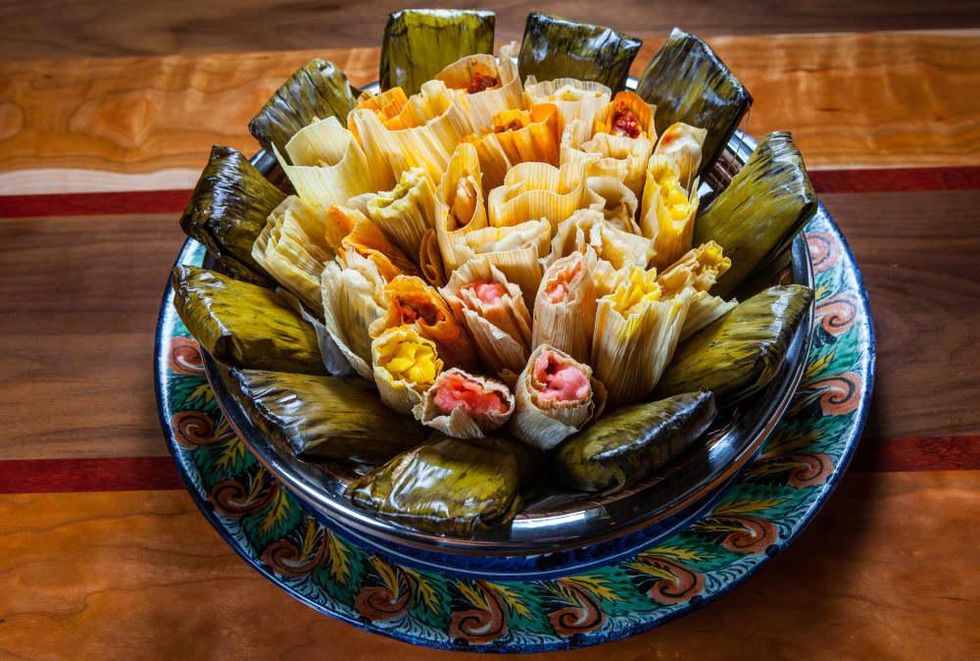Food for Thought
Do you really know what you're drinking? Wine-based cocktails are Houston'shidden, delicious margaritas & more
 So, Dad and I were having a typical lunch at Phil & Derek’s Restaurant and WineBar when chef/owner Phillip Mitchell asked if we wanted to sample his new frozenmargaritas.Photo by Barbara Kuntz
So, Dad and I were having a typical lunch at Phil & Derek’s Restaurant and WineBar when chef/owner Phillip Mitchell asked if we wanted to sample his new frozenmargaritas.Photo by Barbara Kuntz Whoa there pardner, Phil & Derek’s is a wine bar with a wine and beer retailerspermit (known as a BG) not a full liquor license. So how are they servingmargaritas? Well, the same way that a lot of smaller taquerias are. They’re madewith wine, not tequila.Photo by Marene Gustin
Whoa there pardner, Phil & Derek’s is a wine bar with a wine and beer retailerspermit (known as a BG) not a full liquor license. So how are they servingmargaritas? Well, the same way that a lot of smaller taquerias are. They’re madewith wine, not tequila.Photo by Marene Gustin My personal favorite: The Amore di Verona that tastes like you’re sipping asnifter of amarettoPhoto by Marene Gustin
My personal favorite: The Amore di Verona that tastes like you’re sipping asnifter of amarettoPhoto by Marene Gustin There’s the Custom Reef Superior rum profile wine, Kalana wine that tastespretty much like real Kahlua and more.Photo by Marene Gustin
There’s the Custom Reef Superior rum profile wine, Kalana wine that tastespretty much like real Kahlua and more.Photo by Marene Gustin
So, Dad and I were having a typical lunch at Phil & Derek’s Restaurant and Wine Bar when chef/owner Phillip Mitchell asked if we wanted to sample his new frozen margaritas.
Do I ever say no to a free drink?
It was light, refreshing and tasty.
“I sold out last night,” Mitchell says. “We sell a case every two days.”
Whoa there pardner, Phil & Derek’s is a wine bar with a wine and beer retailers permit (known as a BG) not a full liquor license. So how are they serving margaritas?
Well, the same way that a lot of smaller taquerias are. They’re made with wine, not tequila.
“It really started about 15 years ago,” says Derron Whitaker, sales manager for Liquid Assets. “It started with a niche market, the taquerias and smaller mom and pop Tex-Mex places that could only afford a BG license, they served beer but wanted something for the women. So they started to make wine-based margaritas.”
Whitaker estimates that 70 to 80 percent of the smaller Tex-Mex eateries in Houston operate under a BG license. Which means if you hang at places like El Rey or the smaller Taqueria Arandas and you’ve imbibed a delicious margarita, you’ve tasted a wine-based cocktail. Whitaker says you’ve probably been drinking them for years and never knew.
“If you’re drinking a margarita somewhere and you don’t see a bar,” Whitaker says, “you’re drinking a wine-base cocktail.”
Liquid Assets wholesales the Los Cabos Agave Especial wine made in Mexico, the stuff that’s used to make wine margaritas. But that isn’t all they sell.
“We’re the biggest little mix company you’ve never heard of,” Whitaker says.
Besides the Los Cabos, the company, founded by Jerry McGill, aka Dr. Drinx, creates custom cocktails and private labeling for restaurants around the country. And they sell wine that tastes like liquor.
There’s the Custom Reef Superior rum profile wine, Kalana wine that tastes pretty much like real Kahlua, and my personal favorite, the Amore di Verona that tastes like you’re sipping a snifter of amaretto.
If you hang at places like El Rey and you’ve imbibed a delicious margarita, you’ve tasted a wine-based cocktail. Whitaker says you’ve probably been drinking them for years and never knew.
“I can pretty much do anything, any kind of cocktail,” Whitaker says. “I can even make Jell-O shots with wine. I’ve created a wine and ice cream concoction that’s a cocktail in a cone, and it has the alcohol content of a can of beer.”
Most of these wines come from California, which has similar liquor laws to Texas. In fact, California, Texas and Arizona are the biggest consumers of these types of wines. But why make wine that taste like hard alcohol when we have perfectly good hard alcohol?
Two reasons: First, state liquor laws. Many places, like the Lone Star State, have graduated liquor licenses. A beer and wine license for an establishment is a lot cheaper — and requires a lot less paperwork — than a full liquor license. And there are those pesky laws that prohibit you from wandering around outside an establishment drinking booze. But not so when it comes to beer and wine.
“You go down to Mardi Gras on The Strand,” Whitaker says, “and see all those folks walking the streets with big hurricanes and mojitos? Those are wine-based cocktails.”
And likewise cocktails to-go. Like the ones they serve at W Grill in The Heights where you can pull into the drive through for a juicy burger or tacos and a margarita. What, you think they’re handing you real tequila through that drive-up window? No, that would be illegal. They’re serving you a wine-based cocktail.
Ditto those drive-through daiquiris at Eskimo Hut. They’re either wine based or they’re illegal and I’m betting it’s the first.
And The Dude, the adult milkshake at Little Bigs? Think about it. They only serve beer and wine so what’s in that shake? Hmmmm?
There’s another good reason to drink these wine concoctions.
“I love margaritas,” Whitaker says. “But I can’t drink more than two before getting loopy. With the wine ones you can sip them like ice tea.”
While tequila can have an alcohol content of 35 to 55 percent, the agave wine has a 17 percent alcohol content. Drink more. Suffer less.
Oh, and fermented wines, as opposed to distilled alcohols, have less sugar, so they are less fattening.
At least that’s my story and I’m sticking to it.
Wait, back to Phil & Derek’s.
“We’ll be bringing in more wine cocktails,” Mitchell says. “Next up a wine-based Bloody Mary for our Sunday brunch.”
As much as I love my vodka, I’m so there.





